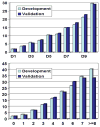Predicting Early Death Among Elderly Dialysis Patients: Development and Validation of a Risk Score to Assist Shared Decision Making for Dialysis Initiation
- PMID: 26123861
- PMCID: PMC4658211
- DOI: 10.1053/j.ajkd.2015.05.014
Predicting Early Death Among Elderly Dialysis Patients: Development and Validation of a Risk Score to Assist Shared Decision Making for Dialysis Initiation
Abstract
Background: A shared decision-making tool could help elderly patients with advanced chronic kidney disease decide about initiating dialysis therapy. Because mortality may be high in the first few months after initiating dialysis therapy, incorporating early mortality predictors in such a tool would be important for an informed decision. Our objective is to derive and validate a predictive risk score for early mortality after initiating dialysis therapy.
Study design: Retrospective observational cohort, with development and validation cohorts.
Setting & participants: US Renal Data System and claims data from the Centers for Medicare & Medicaid Services for 69,441 (aged ≥67 years) patients with end-stage renal disease with a previous 2-year Medicare history who initiated dialysis therapy from January 1, 2009, to December 31, 2010.
Candidate predictors: Demographics, predialysis care, laboratory data, functional limitations, and medical history.
Outcomes: All-cause mortality in the first 3 and 6 months.
Analytical approach: Predicted mortality by logistic regression.
Results: The simple risk score (total score, 0-9) included age (0-3 points), low albumin level, assistance with daily living, nursing home residence, cancer, heart failure, and hospitalization (1 point each), and showed area under the receiver operating characteristic curve (AUROC)=0.69 in the validation sample. A comprehensive risk score with additional predictors was also developed (with AUROC=0.72, high concordance between predicted vs observed risk). Mortality probabilities were estimated from these models, with the median score of 3 indicating 12% risk in 3 months and 20% in 6 months, and the highest scores (≥8) indicating 39% risk in 3 months and 55% in 6 months.
Limitations: Patients who did not choose dialysis therapy and did not have a 2-year Medicare history were excluded.
Conclusions: Routinely available information can be used by patients with chronic kidney disease, families, and their nephrologists to estimate the risk of early mortality after dialysis therapy initiation, which may facilitate informed decision making regarding treatment options.
Keywords: Choosing Wisely; End-stage renal disease (ESRD); chronic kidney failure; conservative care; dialysis initiation; mortality; predictive model; quality of life; risk score; shared decision-making; treatment decisions.
Copyright © 2015 National Kidney Foundation, Inc. All rights reserved.
Figures


References
-
- US Renal Data System. USRDS 2010 Annual Report. Bethesda, MD: The National Institute of Health, National Institute of Diabetes and Digestive and Kidney Diseases; 2010.
-
- Kurella M, Covinsky KE, Collins AJ, Chertow GM. Octogenarians and nonagenarians starting dialysis in the United States. Ann Intern Med. 2007;146(3):177–83. - PubMed
-
- Schmidt RJ. Informing our elders about dialysis: Is an age-attuned approach warranted? Clin J Am Soc Nephrol. 2012;7(1):185–91. - PubMed
-
- O'Hare AM, Choi AI, Bertenthal D, Bacchetti P, Garg AX, Kaufman JS, Walter LC, Mehta KM, Steinman MA, Allon M, McClellan WM, Landefeld CS. Age affects outcomes in chronic kidney disease. J Am Soc Nephrol. 2007;18(10):2758–65. - PubMed
-
- US Renal Data System. USRDS 2009 Annual Data Report: Atlas of Chronic Kidney Disease and End-Stage Renal Disease in the United States. Vol. 2. NIH/NIDDK; Bethesda, MD: 2009. Chapter 1: Emerging Issues: Early mortality on hemodialysis.
Publication types
MeSH terms
Grants and funding
LinkOut - more resources
Full Text Sources
Other Literature Sources
Medical

